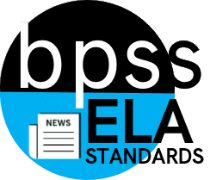BPS District English Standards Book
Completion requirements
Electives
Journalism
 HS Journalism
HS Journalism
"I can ... statements"
 High School Journalism
High School Journalism
The product of high school journalism classes, in many cases a yearbook or newspaper, is more than central purpose of a scholastic journalism program. Instead, it’s about the process, how students engage and work together at a high level of responsibility. Teachers encourage students with use of innovation in the classroom as journalism and communications are adapting to massive technological change.
ELA-JN.JT - Journalism Technology
-
- ELA-JN.JT.01 - Understand and demonstrate how technology can support communication and collaboration, personal and professional productivity, and lifelong learning by using a variety of district-approved Web 2.0 tools
- ELA-JN.JT.01.a - Use spreadsheets and other programs to organize, calculate, graph, sort, and present data in a variety of real?world settings and choose the most appropriate type to represent given data (e.g. publication ladders, submissions, sales, invoices, advertising, etc.).
- ELA-JN.JT.01.b - Use a variety of technology tools (e.g., dictionary, thesaurus, grammar checker, style guide, Google Drive, Google Apps) to maximize the accuracy of work.
- ELA-JN.JT.02 - Make strategic use of digital media in presentations and/or publications to enhance understanding of findings, reasoning, and evidence and to add interest.
- ELA-JN.JT.02.a - Use technology to communicate text, graphics, photography, radio, television, news media as appropriate to emphasize the range of story-telling possibilities.
- ELA-JN.JT.02.a - Use technology to communicate text, graphics, photography, radio, television, news media as appropriate to emphasize the range of story-telling possibilities.
- ELA-JN.JT.01 - Understand and demonstrate how technology can support communication and collaboration, personal and professional productivity, and lifelong learning by using a variety of district-approved Web 2.0 tools
ELA-JN.JL - Journalism Language
-
- ELA-JN.JL.01 - Demonstrate command of the conventions of standard English capitalization, punctuation, and spelling when writing. Write and edit work so that it conforms to style guides (e.g. Associated Press or Chicago style).
- ELA-JN.JL.02 - Acquire and apply knowledge of language to understand how language functions in different contexts, to make effective choices for meaning or style, and to comprehend more fully when reading or listening at the college and career readiness level; demonstrate independence in gathering vocabulary knowledge when considering a word or phrase important to comprehension or expression.
ELA-JN.JR - Journalism Reading
-
- ELA-JN.JR.01 - Read and comprehend informational or literary works independently and proficiently. Evaluate author's choices (e.g. creates mystery, tension, or surprise; point of view, reasoning, and use of evidence and rhetoric; fallacious reasoning or exaggerated or distorted evidence).
- ELA-JN.JR.01.a - Cite strong and thorough evidence to support analysis of text.
- ELA-JN.JR.01.b - Determine theme or central idea; provide an objective summary.
- ELA-JN.JR.01.c - Analyze how an author develops and refines ideas or claims
- ELA-JN.JR.02 - Analyze how characters develop over the course of a text.
- ELA-JN.JR.03 - Determine figurative and connotative meanings of words; analyze word choice.
- ELA-JN.JR.04 - Understand a solid foundation in press law and ethics as it applies to scholastic media, including First Amendment-related rights and responsibilities
- ELA-JN.JR.04.a - Analyze documents of significance regarding journalistic law and ethics (e.g. historic court cases, publication policies, state and national laws, history and evolution of media as well as functions, limitations and influences of media in society).
- ELA-JN.JR.04.a - Analyze documents of significance regarding journalistic law and ethics (e.g. historic court cases, publication policies, state and national laws, history and evolution of media as well as functions, limitations and influences of media in society).
- ELA-JN.JR.01 - Read and comprehend informational or literary works independently and proficiently. Evaluate author's choices (e.g. creates mystery, tension, or surprise; point of view, reasoning, and use of evidence and rhetoric; fallacious reasoning or exaggerated or distorted evidence).
ELA-JN.JW - Journalism Writing
-
- ELA-JN.JW.01 - Organize complex information and produce clear and coherent writing. Write routinely over extended time frames (time for research, reflection, and revision) and shorter time frames (a single sitting or a day or two) for a range of tasks, purposes, and audiences.
- ELA-JN.JW.01.a - Plan, collect, and organize interview materials accurately and professionally--having interviewee's reviewing and verifying information. Records are organized and kept for future use.
- ELA-JN.JW.01.b - Plan, revise, edit, rewrite work or try a new approach.
- ELA-JN.JW.01.c - Plan, revise, edit, and write publication policies, procedures, and style guides (writing, design, social media, etc.).
- ELA-JN.JW.01.d - Develop the topic thoroughly by selecting the most relevant facts, details and quotations.
- ELA-JN.JW.01.e - Integrate multiple sources of information presented in diverse media or formats (e.g., visually, quantitatively*, orally) evaluating the credibility and accuracy of each source. Source material used in writing is accurately cited.
- ELA-JN.JW.01.f - Present information, findings, and supporting evidence clearly, concisely, and logically such that listeners can follow the line of reasoning and the organization, development, substance, and style are appropriate to purpose, audience, and task.
- ELA-JN.JW.02 - Establish appropriate style and voice to assignment and context while attending to conventions of the discipline (e.g. formal style for news and personal approach for creative writing or opinion)
- ELA-JN.JW.03 - Develop high-quality work which reflects journalistic responsibilities (e.g. ethics, law, minimizes harm, accuracy, etc.)
- ELA-JN.JW.03.a - Collaborate on writing by peer editing, offering comments for review on preferred platform (e.g., InDesign and Adobe Suites, Google Docs and Apps, and social media platforms).
- ELA-JN.JW.03.a - Collaborate on writing by peer editing, offering comments for review on preferred platform (e.g., InDesign and Adobe Suites, Google Docs and Apps, and social media platforms).
- ELA-JN.JW.01 - Organize complex information and produce clear and coherent writing. Write routinely over extended time frames (time for research, reflection, and revision) and shorter time frames (a single sitting or a day or two) for a range of tasks, purposes, and audiences.
ELA-JN.JD - Journalism Design
-
- ELA-JN.JD.01 - Present and design information for a variety of audiences and purposes with use of appropriate content to add interest.
- ELA-JN.JD.01.a - Organize complex information, considering formatting such as headlines and infographics when useful.
- ELA-JN.JD.01.b - All source material used is cited accurately and all copyright laws are observed.
- ELA-JN.JD.02 - Analyze the representation of a subject in two different artistic mediums.
- ELA-JN.JD.03 - Establish and use consistent style and conform to publication's expectations for overall, cohesive design.
- ELA-JN.JD.04 - Rules of composition are used effectively to make design more appealing and easy to read and navigate (e.g. white space, Rule of Thirds, modular layout, etc.)
- ELA-JN.JD.05 - Participate in gathering photography coverage for publication.
- ELA-JN.JD.05.a - Work is creative and shows balance and diversity in subject matter.
- ELA-JN.JD.05.b - All digitally edited photos are ethically used and labeled.
- ELA-JN.JD.01 - Present and design information for a variety of audiences and purposes with use of appropriate content to add interest.
ELA-JN.SL - Journalism Speaking and Listening
-
- ELA-JN.SL.01 - Initiate and participate effectively in a range of collaborative discussions (one-on-one, in groups, and teacher-led) with diverse partners on various topics, texts, and issues, building on others' ideas and expressing their own clearly and persuasively. Adapt speech to a variety of contexts and tasks, demonstrating command of formal English when indicated or appropriate.
- ELA-JN.SL.01.a - Collaborate efficiently and effectively by using professional communication and exemplyfiying job success skills (e.g. good intrapersonal and human relationship skills, ability to work as a team, modeling leadership, etc.) (21 Century).
- ELA-JN.SL.01.b - Use conflict resolution, problem-solving, reasoning and negotiation skills (21 Century Skill).
- ELA-JN.SL.01.c - Present to community members and business professionals the importance of supporting student journalism (e.g. fundraising presentations, events, distribution, etc.)
- ELA-JN.SL.01.d - Participate in critiques by giving specific and appropriate feedback.
- ELA-JN.SL.01.e - Collaborate in student leadership positions to decide publication content and class expectations based on professional, journalistic standards, responsibilities, and ethics. Students understand media's role in a democracy, set and assess goals, and embrace civic engagement.
- ELA-JN.SL.01.f - Conduct interviews by effectively communicating interview purpose, meeting place and time, asking specific and intriguing questions, and engaging interviewee in in-depth conversation.
- ELA-JN.SL.01 - Initiate and participate effectively in a range of collaborative discussions (one-on-one, in groups, and teacher-led) with diverse partners on various topics, texts, and issues, building on others' ideas and expressing their own clearly and persuasively. Adapt speech to a variety of contexts and tasks, demonstrating command of formal English when indicated or appropriate.

